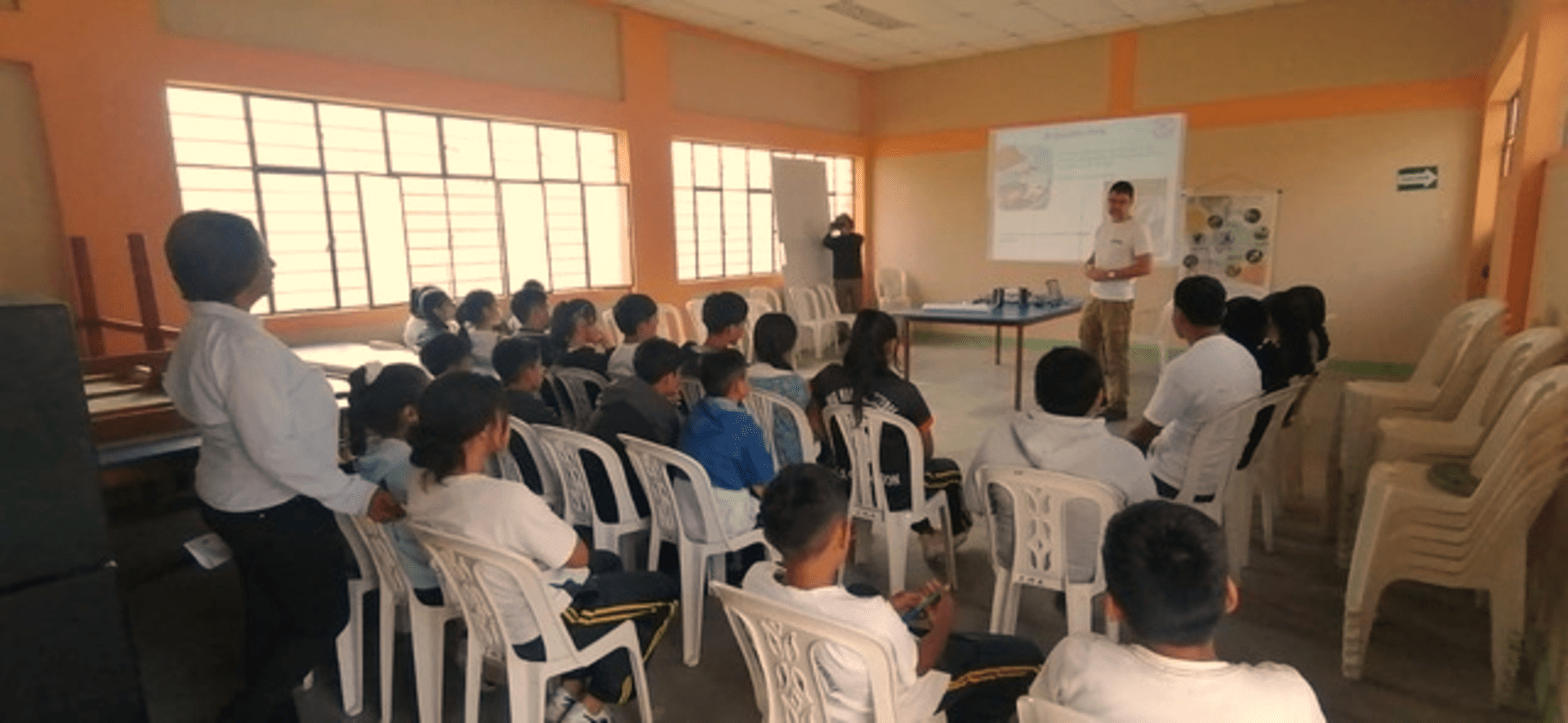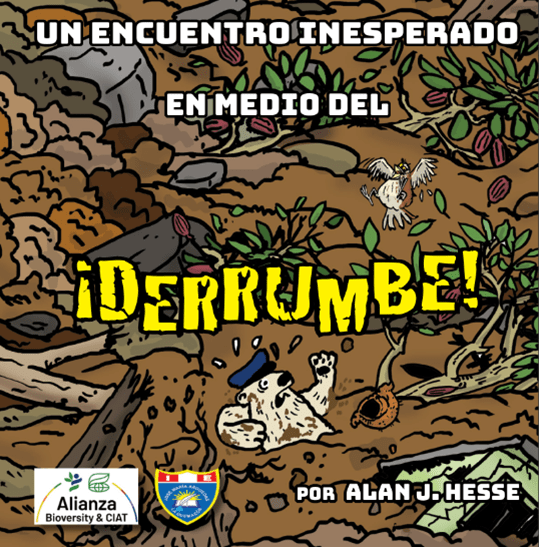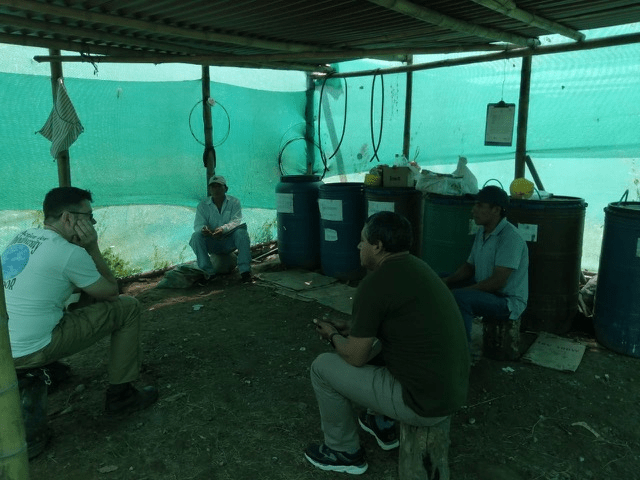Blog Joining Forces: Clima-LoCa and Alan Hesse Lead the Way to a Sustainable Future in Preserving the Environment and Fighting Climate Change

By: Gabriela Salazar, Alianza Bioversity-CIAT, Clima-LoCa project.
By: Gabriela Salazar, Alianza Bioversity-CIAT, Clima-LoCa project.
The Clima-LoCa project had the opportunity to interview the writer, conservation biologist and Climate Change educator, Alan Hesse. In this space we dialogued around the collaboration made between both parties that resulted in the children's book titled: "An Unexpected Encounter in the Midst of the MELTDOWN!". Clima-LoCa and Hesse shared a common goal during this realization: To educate around Climate Change and its impacts. In the case of Clima-LoCa, the main objective was to contribute to reducing the vulnerability of small cocoa farmers to the impacts of climate change on their crops, and in the case of Alan Hesse, to continue his mission to educate on this topic.
Climate change is a global concern that has generated significant debate in recent decades due to the growing evidence of its impacts, rising temperatures, rising ocean levels and warming waters are just some of these impacts, not to mention the social consequences where health risks, poverty and displacement are increasing.
Climate change is a global concern that has generated significant debate in recent decades due to the growing evidence of its impacts, rising temperatures, rising ocean levels and warming waters are just some of these impacts, not to mention the social consequences where health risks, poverty and displacement are increasing.
The United Nations (UN) defines Climate Change as long-term variations in temperatures and weather patterns. What is the cause of these alterations? There is evidence that points to the repercussions derived from human activities, such as fishing, livestock, agriculture, logging, mining, among others, as responsible for these effects. In fact, according to the United Nations, between 2011 and 2020, the highest temperature figures to date have been recorded, and since 1980, each decade has recorded higher temperatures than the previous one.
Understanding this problem allows us to envision a future marked by challenges such as water scarcity, rising sea levels, floods, severe fires, droughts, melting of the poles and loss of biodiversity. These forecasts are the basis for numerous entities, organizations and projects worldwide, all working to address climate change and aspiring to offer humanity the most promising future possible.
Clima-LoCa is a project that, since 2020, has been focused on providing scientific solutions for smallholder cocoa farmers to improve their product through environmentally friendly practices. Recognizing the interconnectedness of planet earth as a system that rewards the extent to which humans preserve the environment, the project provides tools to small cocoa producers so that they can learn about different agricultural practices that allow them to adapt to climate change and its effects, such as high cadmium concentrations in their product, a consequence of climate change.
Clima-LoCa collaborated with writer, conservation biologist and educator; Alan Hesse, creator of the book series "The Adventures of Captain Polo", which narrates experiences related to climate change of a polar bear known as "Captain Polo". This collaboration arises from the need to create awareness through a narrative about climate change and its environmental repercussions.

This is how the Clima-LoCa project had the opportunity to speak with Alan and learn about his creative process in writing the book entitled: "An unexpected encounter in the midst of the MELT!"
"It all started when I was invited to go to the site (La Quemazón in Piura, Peru), I traveled overland from Ecuador to Peru and talked to key actors, such as cocoa farmers and farm owners, visited key places, took pictures and interacted with students and teachers at the local school," says Hesse.

For Alan, this "adventure" as he describes his trip to Peru, allowed him to meet the second main character of the story. "I discovered that there is the chilalo which is a local and much loved little bird there, in fact, there are many folkloric stories based on it, so yes or yes I had to include it in the story."
After the visit to Peru, Hesse returned to Ecuador and began to organize the themes and thread for his story. "From the beginning I wanted to focus on the theme of climate adaptation and focus it on the community in which the story is based, and the theme is not so much climate mitigation, but adaptation. Talking with the Clima-LoCa technicians, I gathered the technical information, and then I put on my creative hat."
"An unexpected encounter in the middle of a landslide!" tells the story of Captain Polo's arrival in La Quemazón, Peru, after being swept away by the heavy landslides in the area. During this adventure, Polo discovers a fruit unknown to him and meets Chilalo, a local inhabitant who reveals information about this fruit, known as cacao. As a token of appreciation, Polo teaches the cocoa farmers methods to preserve the planet through sustainable farming practices, thus helping to mitigate the impacts of climate change.
Alan Hesse concluded the interview; extending an invitation to people to visit his academy (Captain Polo Academy), which emerged this year with the purpose of expanding his book series without deviating from his focus on education for climate action. Its goal is to transform Captain Polo into a brand committed to promoting climate change mitigation through writing-based education. Similar to The Captain Polo Academy, Clima-LoCa also contributes to climate change mitigation. In this case, it did so through the creativity of Alan Hesse, who through his storytelling supported the initiative at the La Quemazón school. His purpose was to instill in the students, from an early age, the fundamental concepts of climate change adapted to their reality, considering that they are children of farmers in the area, recognized for being the land of the best white cacao.
"The objective of the story is to be a vehicle to accustom the new generation to the concepts of adaptation to a changing climate that affects the agricultural practice of cocoa." The story supports the socioeconomic component of the project and, with its adaptive research approach, fosters climate change mitigation strategies that reduce the vulnerability of smallholder cocoa farmers.
Read "An Unexpected Encounter in the Midst of the MELTDOWN!"
Clima-LoCa is a regional project led by the Bioversity Alliance and CIAT, implemented with research partners from Latin America and Europe, and funded by the European Union. The project contributes to the objectives of the 2018 call "Climate Relevant Innovation through Research in Agriculture" of the DeSIRA (Development Smart Innovation through Research in Agriculture) platform.
Disclaimer
The contents are the sole responsibility of the author and do not necessarily reflect the views of the European Union.
Copyright © 2023 Alliance of Bioversity International and International Center for Tropical Agriculture (CIAT)
